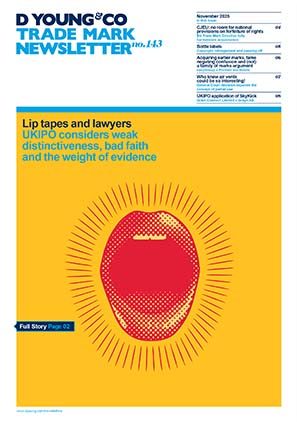Missed an opportunity? MASTERCHEF & MISTER CHEF
This case highlights that, in certain circumstances, a lack of conceptual similarity between two marks can trump a high level of visual and aural similarity such that, even for identical goods, confusion is unlikely to arise.
The applicant filed for MISTER CHEF in class 21 and was opposed by the owner of the MASTERCHEF trade mark, well known for the television series which has run for more than 20 years attracting audiences of up to 6 million viewers. The opposition was filed under both S.5(2)(b) and 5(3) of the Act.
The hearing officer considered the global assessment of likelihood of confusion. He decided that the goods were likely to be selected by consumers, being members of the general public, paying a normal degree of attention, and found them to be the same.
He went on to consider the degree of distinctive character of the earlier mark and concluded: “that both the CHEF element, and the earlier mark as a whole, have a below average degree of inherent distinctiveness in relation to the goods at issue. There is no evidence of use of MASTERCHEF/MASTER CHEF in the UK prior to the relevant date in relation to goods in class 21. Consequently, the distinctive character of the mark rests on its inherent level of distinctiveness.”
Visually and aurally the hearing officer decided the marks are “similar to quite a high degree”.
The crux of the case turned on the opponent’s submission that the marks were also conceptually similar. Although Master can have different meanings the hearing officer emphatically disagreed. He went on to say:
“MISTER is plainly a title for an adult male. The meaning of CHEF is obvious. The combination conveys the meaning of a person or chef called Mister Chef. By contrast, the word MASTER in MASTERCHEF/MASTER CHEF will be understood by relevant average consumers as meaning a skilled practitioner of a particular art or activity. Therefore, MASTERCHEF/MASTER CHEF means a highly skilled chef. This means that, when compared as wholes, the marks have quite distinct meanings. I therefore find that the marks are conceptually dissimilar.”
The hearing officer went on to hold that because the difference between the marks was near the beginning (and therefore, he felt, would be more noticeable) and on the basis the earlier mark had a below average level of inherent distinctiveness, confusion would be unlikely to arise. He also considered the possibility of confusion occurring through imperfect recollection but felt that the different meanings of the marks made this unlikely.
The opposition therefore failed under the likelihood of confusion test.
We find this decision surprising. Although MISTER and MASTER can have different meanings, they can also be similar with MASTER inferring a junior or young man. The hearing officer appears to have selected one meaning from the dictionary ignoring others which may have led to a conclusion that, conceptually, the marks were at least averagely similar.
It is also questionable that MASTER CHEF should be considered to have a low level of distinctive character for the goods. For chef related services this could be a reasonable conclusion, less so for class 21 goods.
In our view, taking into account the identity between the two sets of goods and the high level of visual and aural similarity, considering the global assessment, confusion would be likely and therefore the opposition should have succeeded on this ground.
Would the opponent fare any better based on their considerable reputation under S.5(3)? The hearing office held that with its “substantial” reputation this would lead to a normal level of distinctive character for the MASTER CHEF mark through extensive use in relation to the well known television show. However, following the guidance set out in the Intel decision the hearing officer, stated: “In my view, the differences between the marks and the goods and services are sufficient to avoid a likelihood of confusion. I find that the UK public would not make any link between, on the one hand, the contested mark and the goods covered by the application and, on the other hand, the earlier mark and the entertainment services for which it has a reputation. The opposition under section 5(3) therefore fails. This is because, unless the public will make a link between the marks, use of the contested mark cannot take unfair advantage of the reputation acquired by the earlier mark.”
The case highlights that notwithstanding a high degree of similarity between two marks and two sets of identical goods this will not always lead to a finding that confusion is likely to arise.
Case details at a glance
Jurisdiction: United Kingdom
Decision level: UK Intellectual Property Office
Parties: Trade mark application no. 3175431 by Mr Chef Limited and opposition no. 407756 by Shine TV Limited
Date: 10 April 2018
Citation: [2018] UKIntelP o22818
